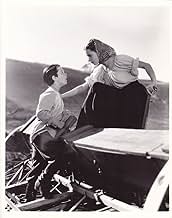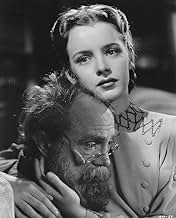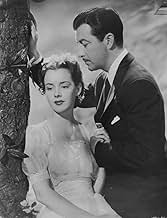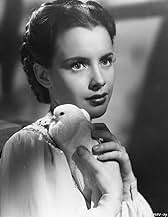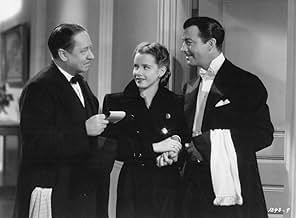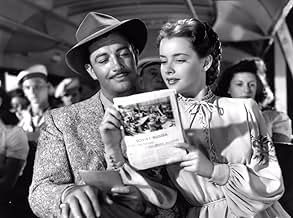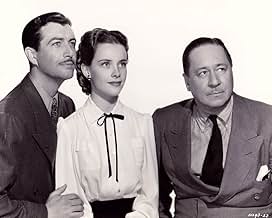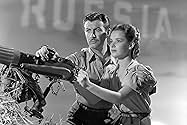CALIFICACIÓN DE IMDb
5.8/10
337
TU CALIFICACIÓN
Agrega una trama en tu idiomaPropaganda film from WW2, designed to raise the awareness of the American public regarding USSR's fight against Nazi Germany.Propaganda film from WW2, designed to raise the awareness of the American public regarding USSR's fight against Nazi Germany.Propaganda film from WW2, designed to raise the awareness of the American public regarding USSR's fight against Nazi Germany.
- Dirección
- Guionistas
- Elenco
- Premios
- 2 premios ganados en total
Konstantin Shayne
- Wounded Soldier
- (as Konstantine Shayne)
John Wengraf
- Red Army Commander
- (as John E. Wengraf)
Opiniones destacadas
This was the first film that I can recall seeing, way back in the 1940s. I was about 6 or 7 years old at the time (I'm now 66). I can remember nothing of the rose-tinted picture of Stalin's Russia described in John Barnes' comments.
In fact, I can recall little of the plot, other than that it featured an orchestral conductor and extracts from Tchaikovsky's 1st Piano Concerto. Thus, the film introduced me to Tchaikovsky and classical music and, for that, I am eternally grateful.
In fact, I can recall little of the plot, other than that it featured an orchestral conductor and extracts from Tchaikovsky's 1st Piano Concerto. Thus, the film introduced me to Tchaikovsky and classical music and, for that, I am eternally grateful.
"Song of Russia" is far from a great film, but it is really fascinating to look at nowadays, both as a historical time capsule and as an excellent specimen of MGM camp. The film was designed to drum up sympathy for our then-allies, the Soviet Union, and is sheer, unabashed propaganda. It is well-enough made, but, meaning no disrespect to the millions of Russians who suffered and died during the war, it is so cornball and manipulative seen now that its difficult to take seriously. In fact, its most famous now for the after-effects of its release at the end of the 40's in the HUAC meetings where Robert Taylor testified and "named names" and where it caused all sorts of problems for its makers. Robert Taylor rises to his usual heights of bland adequacy here, but Susan Peters, a tragic actress if ever there was one, does quite well as his Russian bride.
Some of the more hilarious scenes include a wedding dance where the entire village takes part and come across more like a Broadway troupe with decades of experience and the depiction of the "typical" Russian village,which looks like a Slavic version of Andy Hardy's small town. Miss Peters character is also quite the Russian Superwoman - a concert pianist who can cook a mean dinner when she's not riding tractors, shooting machine guns and teaching a class of schoolchildren how to make a Molotov Cocktail. Its amazing she was able to be convincing in the slightest degree in this role, but she does as well as anyone could.
Some of the more hilarious scenes include a wedding dance where the entire village takes part and come across more like a Broadway troupe with decades of experience and the depiction of the "typical" Russian village,which looks like a Slavic version of Andy Hardy's small town. Miss Peters character is also quite the Russian Superwoman - a concert pianist who can cook a mean dinner when she's not riding tractors, shooting machine guns and teaching a class of schoolchildren how to make a Molotov Cocktail. Its amazing she was able to be convincing in the slightest degree in this role, but she does as well as anyone could.
Like a previous writer, I too saw this movie as a child during World War 11.
I really cannot comment on its artistic value so many years later, however, as a young person ( with my Father overseas)during that point in history, it was something to see to bring closer the effects and personality of war. The one poignant thing about the movie that I still remember clearly was the playing of Tchaikovsky's very famous Piano Concerto #1 in B-Flat. It was my first real introduction to classical music. If nothing else, I am thankful for the film bringing this to me, for it and classical music have played an enormous part in my life ever since! It led me to study music and have been professionally involved in music all my working life. My thanks go to "Song Of Russia" and Tchaikovsky -Doug-
I really cannot comment on its artistic value so many years later, however, as a young person ( with my Father overseas)during that point in history, it was something to see to bring closer the effects and personality of war. The one poignant thing about the movie that I still remember clearly was the playing of Tchaikovsky's very famous Piano Concerto #1 in B-Flat. It was my first real introduction to classical music. If nothing else, I am thankful for the film bringing this to me, for it and classical music have played an enormous part in my life ever since! It led me to study music and have been professionally involved in music all my working life. My thanks go to "Song Of Russia" and Tchaikovsky -Doug-
"Song of Russia" was never made to accurately portray Soviet peasantry, but rather to enlighten the West of the Anti-Nazi plight of the Russian citizens.Director Gregory Ratoff is no more guilty of tainting the truth for entertainment's sake than were many American directors for their careless, racist portrayal of the "savage" American Indian.
Stalin and Hitler were both maniacal murderers, but in 1943 much less was known of the atrocities these two leaders committed. If Western leaders had known better in 1943, greater efforts should have been made to stop the bloodshed. 20/20 hindsight gives us great power to criticize filmmakers of that period, but what of Roosevelt and Churchill? What did they know, and what did they do about it?
"Song of Russia" was a warning and a call for help.Although Russian peasants weren't as "Americanized" as the film portrays, they did defend their land against the fascists and lost over 20 million people doing it.I enjoyed the film, and yes, I thought the peasants looked a bit well-to-do for the period, but that helped me imagine what we as Americans might have confronted if the Nazis had made it past England and Russia.
Stalin and Hitler were both maniacal murderers, but in 1943 much less was known of the atrocities these two leaders committed. If Western leaders had known better in 1943, greater efforts should have been made to stop the bloodshed. 20/20 hindsight gives us great power to criticize filmmakers of that period, but what of Roosevelt and Churchill? What did they know, and what did they do about it?
"Song of Russia" was a warning and a call for help.Although Russian peasants weren't as "Americanized" as the film portrays, they did defend their land against the fascists and lost over 20 million people doing it.I enjoyed the film, and yes, I thought the peasants looked a bit well-to-do for the period, but that helped me imagine what we as Americans might have confronted if the Nazis had made it past England and Russia.
I'll be the first to admit that this film was a bald effort at propaganda. I'll also admit that the conditions depicted in Russia were far from reality. However, this isn't the first effort at propaganda by Hollywood, nor is it the first (or the thousandth) that takes a wide berth from reality.
If you look at the movie's setting (happy Russians with a benevolent leader) as fantasy, and imagine the Russia shown in the movie as a mythical nation, then you have a dandy story here. Propaganda aside, the storyline here is excellent; it's engrossing, well-written and intelligent. The acting is superb, from top stars Taylor and Peters down to the bit players and extras. The dance scenes are well choreographed.
The music, mostly that of Tchaikovsky, is superb, and the soundtrack is masterfully woven into the background throughout the story. The music is well-played and well conducted by Albert Coates (who also did the piano work). As for the piano, Susan Peters does a good job of finger placement that could fool all but the trained eye into thinking that she could actually play the piano (she couldn't at the level shown in the movie). The one fault herein is Taylor's attempts to imitate a conductor: suffice it to say that it's out of sync and overstated to the point of absurdity.
As a side note, many of the members of the Peter Meremblum orchestra (prodigal young musicians, many of whom went on to careers in music, and a few of whom became very well-known in the world of music) appear throughout the movie, mainly as extras and as kids in the village and youths in the Moscow Conservatory. The orchestra also performed some of the background music.
All in all, this is an excellent movie if one can overlook the propaganda and anti-realism and treat it as a fantasy/fiction.
If you look at the movie's setting (happy Russians with a benevolent leader) as fantasy, and imagine the Russia shown in the movie as a mythical nation, then you have a dandy story here. Propaganda aside, the storyline here is excellent; it's engrossing, well-written and intelligent. The acting is superb, from top stars Taylor and Peters down to the bit players and extras. The dance scenes are well choreographed.
The music, mostly that of Tchaikovsky, is superb, and the soundtrack is masterfully woven into the background throughout the story. The music is well-played and well conducted by Albert Coates (who also did the piano work). As for the piano, Susan Peters does a good job of finger placement that could fool all but the trained eye into thinking that she could actually play the piano (she couldn't at the level shown in the movie). The one fault herein is Taylor's attempts to imitate a conductor: suffice it to say that it's out of sync and overstated to the point of absurdity.
As a side note, many of the members of the Peter Meremblum orchestra (prodigal young musicians, many of whom went on to careers in music, and a few of whom became very well-known in the world of music) appear throughout the movie, mainly as extras and as kids in the village and youths in the Moscow Conservatory. The orchestra also performed some of the background music.
All in all, this is an excellent movie if one can overlook the propaganda and anti-realism and treat it as a fantasy/fiction.
¿Sabías que…?
- TriviaDebut of actress Joan Lorring.
- ErroresAlthough the film is set during the Axis invasion of the Soviet Union in 1941, uniforms and equipment shown in both the stock footage and the American-filmed scenes are largely from the period of 1943-44, when the film was made. Of particular note are the helmets and rank insignia which are indicative of this later era.
- ConexionesFeatured in Red Hollywood (1996)
- Bandas sonorasPiano Concerto No.1 in B flat minor, Op.23
(uncredited)
Music by Pyotr Ilyich Tchaikovsky
[Played by Susan Peters on piano, with an orchestra at a rehearsal; Reprised at a concert on tour in Russia, with Albert Coates on piano; Reprised by Peters in a New York concert; Excerpts played often in the score, adapted by Herbert Stothart]
Selecciones populares
Inicia sesión para calificar y agrega a la lista de videos para obtener recomendaciones personalizadas
Detalles
Taquilla
- Presupuesto
- USD 1,828,000 (estimado)
- Tiempo de ejecución1 hora 47 minutos
- Color
- Relación de aspecto
- 1.37 : 1
Contribuir a esta página
Sugiere una edición o agrega el contenido que falta

Principales brechas de datos
What is the Spanish language plot outline for Sombras en la nieve (1944)?
Responda

